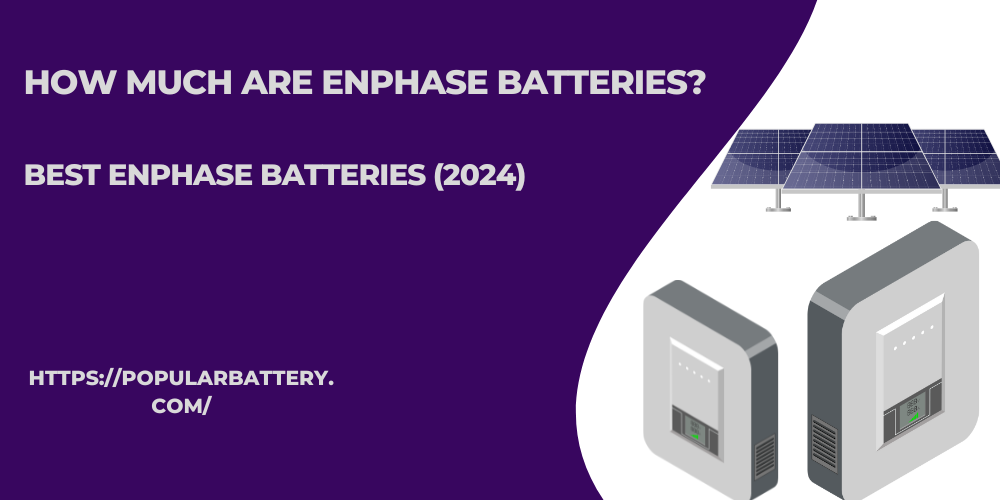How much are Enphase batteries? best Enphase batteries (2024). Enphase Energy offers a range of solar battery storage solutions as part of its Enphase Energy System, with the Enphase encharge being their main storage product.
Enphase Encharge batteries cost between $10,000 and $15,000 for the 10.1 kWh model, excluding installation. The 3.3 kWh model is cheaper. Prices can vary based on installation complexity and location. Rebates and incentives may lower the cost.
The Enphase encharge battery system is modular and comes in two main configurations: the encharge 3 and the encharge 10, which are designed to work seamlessly with Enphase microinverters, providing backup power and increasing energy independence when paired with a solar panel system.
How much are Enphase batteries? best Enphase batteries (2024).
Overview of Enphase Batteries.

Introduction to Enphase Batteries: Enphase Energy offers advanced battery storage solutions, primarily through its Encharge lineup. These batteries are designed to store excess energy generated by solar panels for use during peak demand times, power outages, or when solar production is low, enhancing energy independence and efficiency.
Modular Design: The Enphase battery systems come in two main sizes – the Encharge 3 (3.3 kWh) and the Encharge 10 (10.1 kWh). Their modular design allows for flexibility in installation and scalability, enabling homeowners to tailor their energy storage capacity to their specific needs.
Integration with Enphase Ecosystem: Enphase batteries are part of the Enphase Energy System, which includes microinverters, the Enphase Envoy for system monitoring, and the Enlighten software platform. This integration allows for seamless communication and management of energy production, storage, and consumption, optimizing the efficiency of the entire solar system.
Safety and Reliability: Enphase takes safety seriously, incorporating multiple layers of protection in their batteries, including thermal management systems and software controls to prevent overcharging and overheating. Their batteries are also designed to be durable and long-lasting, providing reliable energy storage for years.
Smart Energy Management: Through the Enphase Enlighten platform, homeowners can monitor and control their energy usage and storage in real-time. This platform provides insights into energy consumption patterns, solar generation, and battery usage, enabling users to make informed decisions about their energy use and maximize their savings and efficiency.
Factors Affecting the Cost of Enphase Batteries.

- Battery Model and Capacity: The cost of Enphase batteries is significantly influenced by the model and its storage capacity. Enphase offers the Encharge 3 (3.3 kWh) and the Encharge 10 (10.1 kWh) models. The larger the capacity, the higher the cost, with the Encharge 10 being more expensive due to its higher energy storage capability.
- Installation Complexity: The installation process can affect the overall cost. Factors such as the layout of your home, the existing electrical system’s compatibility, and the necessity for additional components can all increase the complexity and cost of installation. Labor costs also vary by location, impacting the total price.
- Additional Equipment and Upgrades: Sometimes, integrating an Enphase battery into a solar panel system may require additional equipment or upgrades, such as a new or upgraded electrical panel, additional wiring, or the installation of an Enphase Envoy for system monitoring. These additions can increase the overall cost.
- Local Incentives and Rebates: The final cost can be offset by local, state, or federal incentives and rebates for installing solar and energy storage systems. These financial incentives can significantly reduce the upfront cost, but they vary widely by location and specific program availability.
- Supply and Demand: Market conditions, including supply chain issues and demand for solar batteries, can influence the price of Enphase batteries. In times of high demand or when there are supply chain disruptions, prices may increase due to the basic economic principle of supply and demand.
Installation Process and Considerations.

The installation of Enphase batteries involves site assessment by certified installers to determine optimal placement and system size. Electrical system compatibility is checked, and necessary upgrades are identified. The modular design allows for flexible setup. Professional installation ensures safety and system efficiency. Post-installation, system integration with the Enphase Envoy and Enlighten platform enables monitoring and management of energy usage.
Financial Incentives and Rebates.

- Federal Investment Tax Credit (ITC): Homeowners can benefit from the ITC, which allows them to deduct a significant percentage of their solar battery installation costs from their federal taxes, effectively reducing the overall investment required.
- State Incentives: Many states offer additional incentives for solar battery installations, which can include rebates, tax credits, or grants. These incentives vary by state and are designed to reduce the cost and encourage the adoption of renewable energy solutions.
- Local Utility Programs: Some local utilities offer rebate programs for homeowners who install solar batteries, aiming to promote energy independence and reduce demand on the grid during peak times. Participation in these programs can further decrease the upfront costs.
- Net Metering: While not a direct financial incentive for battery installation, net metering policies allow homeowners to sell excess solar energy back to the grid, optimizing the return on investment for their entire solar energy system, including batteries.
- Renewable Energy Certificates (RECs): In some regions, homeowners can earn RECs for the renewable energy their system produces. These certificates can be sold on the energy market, providing an additional income stream that helps offset the cost of solar battery systems.
Real-world Applications and Benefits.

Enphase batteries provide homeowners with energy independence by storing surplus solar power for use during outages or peak times, reducing reliance on the grid. They enable significant electricity bill savings over time. Environmentally, they support a lower carbon footprint by maximizing renewable energy use. The flexibility and scalability of Enphase systems cater to diverse household needs, demonstrating their real-world applicability and advantages.
Conclusion
Enphase batteries, specifically the encharge 3 and encharge 10 models, vary in price, typically ranging between $10,000 to $15,000 before installation. Costs are influenced by factors like model, installation complexity, and location. Financial incentives can significantly reduce the investment, making them a valuable addition for energy independence and savings.
Faqs
Qno1: How much does the Enphase battery cost?
Ans: The cost of Enphase batteries, such as the Encharge 3 and Encharge 10, varies but generally ranges between $10,000 to $15,000 before installation. Prices can fluctuate based on model, installation complexity, and location.
Qno2: What is the life expectancy of an Enphase battery?
Ans: The life expectancy of an Enphase battery is typically around 10 years, with a warranty period that covers this duration, ensuring reliable energy storage and performance over time.
Qno3: Can an Enphase battery run a AC unit?
Ans: An Enphase battery can run an AC unit, but the duration depends on the battery’s capacity and the AC unit’s power consumption. Proper system sizing is crucial for optimal performance.
Qno4: How much does Enphase cost per watt?
Ans: The cost per watt for an Enphase system, including microinverters and batteries, varies widely based on system size and configuration, generally ranging between $2.50 to $3.50. Accurate pricing requires a custom quote considering specific installation and equipment needs.
Qno5: What type of battery does Enphase use?
Ans: Enphase uses lithium iron phosphate (LiFePO4) batteries for their energy storage systems, known for their safety, stability, and long cycle life.

